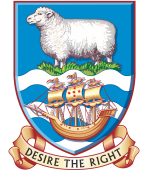Land Recovery Programme Consultation
The Falkland Islands Government (FIG) has launched a public consultation to help shape a Land Recovery Programme. This initiative is aimed at supporting farmers and other land managers in restoring degraded land, sustaining agricultural productivity, and enhancing biodiversity.
Development of a programme recognises the increasing pressures camp communities and landscapes face from economic uncertainty, climate change, and environmental challenges. The proposed programme seeks to place economically and environmentally sustainable land management at the heart of agricultural policy. It aims to ensure that landowners are fairly compensated for their role in sustaining the landscapes and livelihoods that are essential to all of society in the Falkland Islands.
FIG is committed to working with the community to design a programme that is practical, effective, and beneficial to all. The consultation will explore three key issues:
- Goals and Scale – What should the programme’s main objectives be, and how much land should be covered?
- Funding – What financial support should be provided, and how should it be structured?
- Eligibility and Participation – Who should be able to take part, and what conditions should apply?
The consultation is an opportunity for farmers, conservation groups, businesses, and the wider public to have their say. Feedback can be provided through an online survey, written submissions, or by attending community workshops that will be announced for later this year.
The counsultation can be found here: Land Recovery Consultation Survey
For more information, to complete the survey, or to arrange a one-on-one discussion, please contact the Department of Agriculture at This email address is being protected from spambots. You need JavaScript enabled to view it. / 27355.
Downloads:
Agriculture in the Falkland Islands
Much of the Falklands land mass is used for agriculture. The main product is wool, with an EU approved abattoir producing mutton and lamb for local and export markets and beef for local markets.
The Falkland Islands have 70 (according to the 2022/23 FI Farm Statistics) farms, which are mostly family owned, totalling 1,143,596ha of land. In total these farms graze just under half a million sheep of various breeds including; predominantly Polwarth/Merino cross with increased Merino genetics and a small number of Texel, Corriedales, SAMM and others. Approx. 50 of these farms also have a total cattle population just over 3,000 which consist mainly of Aberdeen Angus, Hereford, Red Devon and Murray Grey breeds.
The environment here produces exceptionally clean and white wool for which the Falkland Islands do have a very good reputation in their wool trading. The approx. annual wool production for the Falkland is 1,500,000 kg of greasy wool with an average weight of 3.71 kg and a fibre diameter range of 16.8-28µm. 43% of farms are accredited under the Responsible Wool Scheme (RWS) plus a small number of farms have organic certification with Australian Certified Organic (ACO) which is a step towards marketing these attributes internationally.
The uniqueness of the environment also throws up its challenges, and it is towards these that the Department of Agriculture (DoA) directs much of its advisory and research efforts and resources.

Role of the Department of Agriculture
Our Vision:
A prosperous and self-reliant agricultural sector that creates opportunities for Falkland Islanders and is highly valued locally and internationally.
Our Mission:
To foster a viable and internationally competitive agricultural industry through integrated applied research, extension, business skills development and regulatory programmes.
Our Goals:
The DoA provides research and extension support to improve profitability and sustainability of farming businesses. A profitable farming sector will support a population living outside Stanley and provide valuable produce for both domestic and export purchase. It is an essential part of the Island Plan. The goals of the FIP scheme are to improve profitability by assisting farmers to develop long term solutions to the problems of poor winter nutrition and low wool income. It is achieving this through enabling grazing management systems which will better nourish the sheep, improving pastures and crops and accelerating genetic progress.
We aim to improve genetics of sheep and cattle herds throughout the Falklands with Artificial Insemination and embryo transfer programmes. Using the National Stud Flock we also aim to improve reproductive performance of sheep flocks.
Sound health and welfare of farm animals is important, and apart from the normal pressures some further restraints imposed by those choosing the organic path will create further challenges for our veterinary section.


